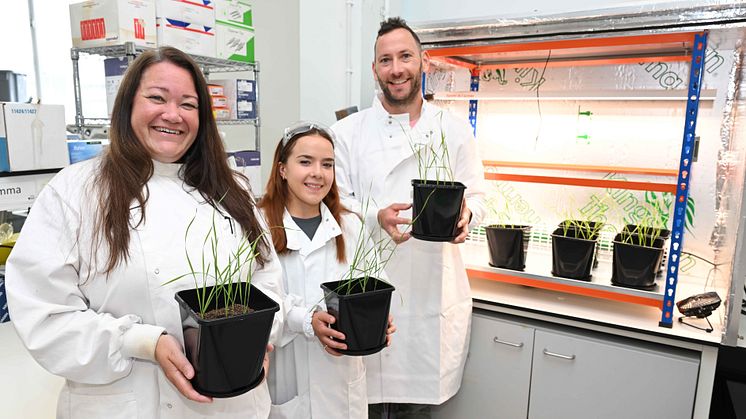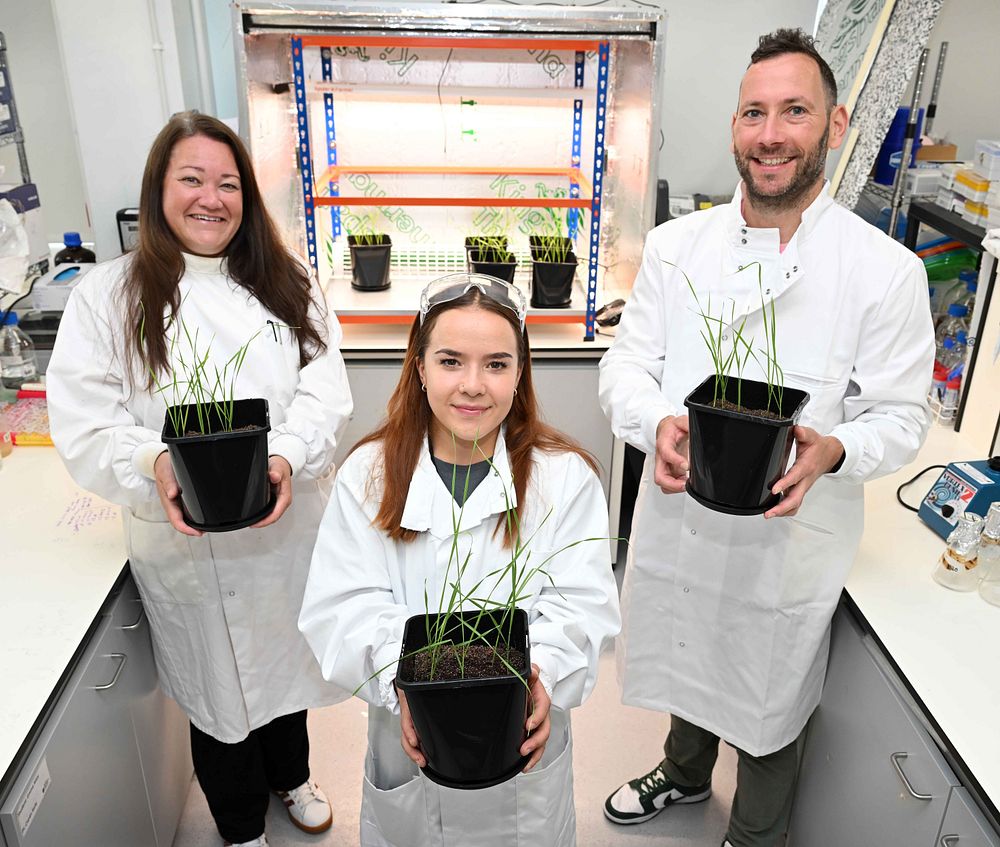
Press release -
Smart bacteria could transform global agricultural food production
With the global population expected to reach 10 billion by 2050 and crop yields declining annually, a team of academics from Northumbria University is developing a revolutionary new approach to food security.
They have been selected by the Advanced Research and Invention Agency (ARIA) as one of only 14 R&D Creators to receive seed funding under its ambitious Programmable Plants opportunity space.
The interdisciplinary team are to receive almost half a million pounds to fund the development of a ‘smart bacterium’ that can dynamically reprogramme how crops respond to environmental stresses in real-time.
The 18-month seed project, entitled Smart Engineered Bacterial Conduits for Enhanced Crop Performance, is led by Dr Ciarán Kelly, Assistant Professor in Synthetic Biology, and Dr Emma Riley, Senior Research Assistant in Biosciences, alongside Dr Angela Sherry, Associate Professor in Microbial Environments, in collaboration with academics from the University of Oxfordand University of Leeds.
The project tackles a fundamental challenge in modern agriculture – crops often respond too cautiously to moderate stress conditions such as moderate drought and low nitrate levels in the soil before fertiliser application, which severely impacts their growth.
"Plants have evolved to prioritise survival over yield," explains Dr Kelly. "But this natural survival mechanism is often counter-productive for food production. Even moderate stress causes plants to shut down growth and switch to defence mode, which is a huge limitation when growing crops for human consumption."
The Northumbria team's innovative solution involves engineering bacterial conduits that act as intelligent intermediaries between plants and their environment.
These smart bacteria will sense environmental cues and plant stress signals, then intervene to rebalance plant hormones in real-time, enabling crops to maintain growth under moderate stress conditions.
This technology could unlock the full yield potential of crops while reducing dependence on fertilisers and pesticides.
"Our engineered bacterial conduits will be in constant feedback with the crop, collating signals from the plant and the external environment, and reprogramming plant behaviour through the regulation of key plant-hormone ratios," explains Dr Kelly. "We're introducing rapid, dynamic control of crop behaviour in the field for the first time, reprogramming the plant in real-time to respond quickly and appropriately to stress."
Dr Emma Riley, who brings expertise in plant-bacteria interactions from her PhD research, said: "We're building on decades of research into plant growth-promoting bacteria that are already used safely in agriculture. Our innovation is adding programmable intelligence to these robust systems, allowing dynamic intervention based on real-time stress conditions."
Dr Kelly emphasises the broader implications: "We're not just tweaking existing systems – we're completely reimagining how we approach crop development. Instead of the traditional months-long process of plant genetic modification in laboratories, we're using smart bacteria to transform the plant’s behaviour in the field itself. Being selected by ARIA as one of their R&D Creators highlights the potential global impact of this research and we’re delighted this has been recognised and supported by ARIA.”

ARIA is the UK's newest research funding agency, sponsored by the Department for Science, Innovation and Technology, and funds teams of scientists and engineers to pursue research at the edge of what is scientifically and technologically possible.
ARIA's Programmable Plants opportunity space, led by Programme Director Angie Burnett, recognises that plants represent 80% of Earth's biomass and are rapidly, cost-effectively and widely distributed across our planet. This makes plants an ideal technological platform to provide low-cost, sustainable resources at scale.
ARIA's opportunity spaces reach across disciplines, sectors, and institutions, bringing together scientists and engineers with diverse fields of expertise to break down silos and discover new pathways.
Being selected as one of only 14 R&D Creators from a highly competitive field demonstrates the exceptional potential of Northumbria's approach and the team's expertise in synthetic biology, microbiology and plant sciences.
Their 18-month seed project will establish proof-of-concept for the engineered bacterial conduits, with the potential for follow-up funding to develop more sophisticated applications.
The Northumbria team anticipate that the technology could be field-ready within 10-20 years, initially in territories where genetically modified agricultural bacteria are already in use.
Topics
Categories
UNIVERSITY OF THE YEAR 2022 (Times Higher Education Awards)
Northumbria is a research-intensive university that unlocks potential for all, changing lives regionally, nationally and internationally.
Two thirds of Northumbria's undergraduate students come from the North East region and go into employment in the region when they graduate, demonstrating Northumbria's significant contribution to social mobility and levelling up in the North East of England.
Find out more about us at www.northumbria.ac.uk
--- Please contact media.communications@northumbria.ac.uk with any media enquiries or interview requests ---







